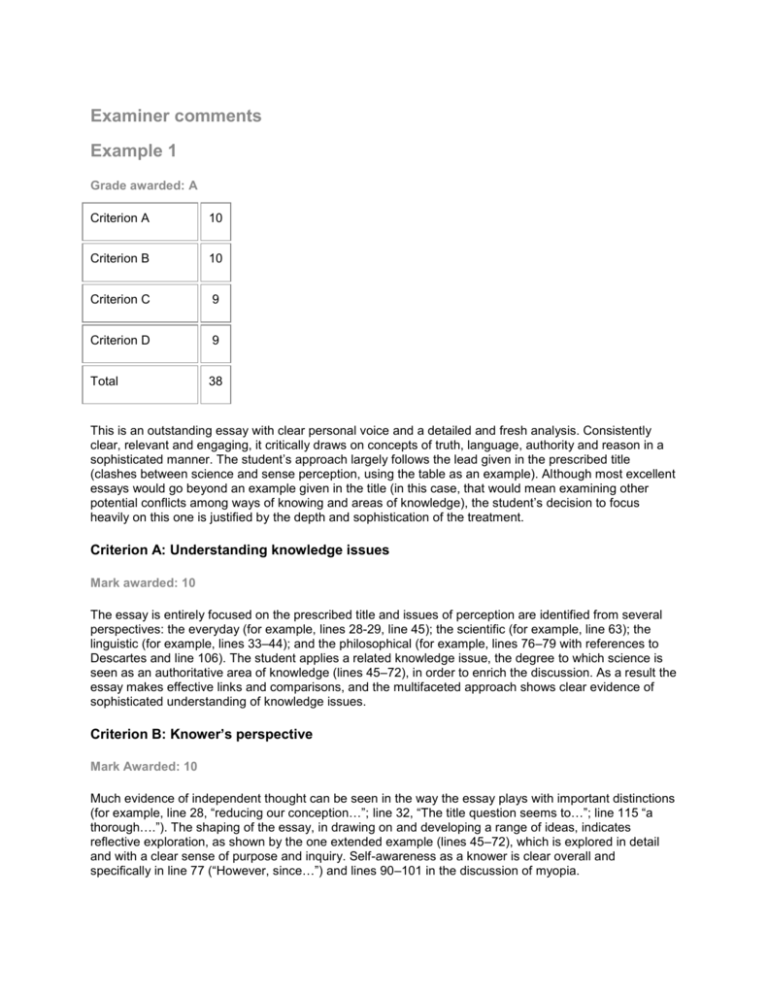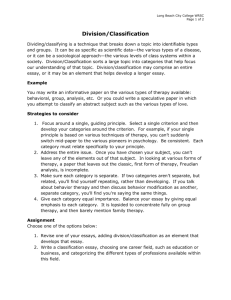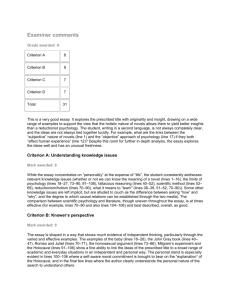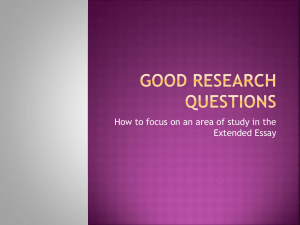Examiner comments
advertisement

Examiner comments Example 1 Grade awarded: A Criterion A 10 Criterion B 10 Criterion C 9 Criterion D 9 Total 38 This is an outstanding essay with clear personal voice and a detailed and fresh analysis. Consistently clear, relevant and engaging, it critically draws on concepts of truth, language, authority and reason in a sophisticated manner. The student’s approach largely follows the lead given in the prescribed title (clashes between science and sense perception, using the table as an example). Although most excellent essays would go beyond an example given in the title (in this case, that would mean examining other potential conflicts among ways of knowing and areas of knowledge), the student’s decision to focus heavily on this one is justified by the depth and sophistication of the treatment. Criterion A: Understanding knowledge issues Mark awarded: 10 The essay is entirely focused on the prescribed title and issues of perception are identified from several perspectives: the everyday (for example, lines 28-29, line 45); the scientific (for example, line 63); the linguistic (for example, lines 33–44); and the philosophical (for example, lines 76–79 with references to Descartes and line 106). The student applies a related knowledge issue, the degree to which science is seen as an authoritative area of knowledge (lines 45–72), in order to enrich the discussion. As a result the essay makes effective links and comparisons, and the multifaceted approach shows clear evidence of sophisticated understanding of knowledge issues. Criterion B: Knower’s perspective Mark Awarded: 10 Much evidence of independent thought can be seen in the way the essay plays with important distinctions (for example, line 28, “reducing our conception…”; line 32, “The title question seems to…”; line 115 “a thorough….”). The shaping of the essay, in drawing on and developing a range of ideas, indicates reflective exploration, as shown by the one extended example (lines 45–72), which is explored in detail and with a clear sense of purpose and inquiry. Self-awareness as a knower is clear overall and specifically in line 77 (“However, since…”) and lines 90–101 in the discussion of myopia. Criterion C: Quality of analysis of knowledge issues Mark awarded: 9 The inquiry into knowledge issues shows a high degree of insight, exploring distinctions in an open but coherent and compelling manner (for example, lines 28–29, lines 39–40, and lines 105–106). The overall argument (that the conflict is more apparent than real) is convincing and shows an ability to question the assumptions of the prescribed title. Implications are mentioned at the end of lines 77–79 (“however…”). The discussion of the microscope in lines 84–89 does, however, feel somewhat contrived and perhaps is better described as a straw man than a serious consideration of a counterclaim. In the context of this example, the uses of the terms “fabrication”, “fraud” and “fake” seem overblown and unjustified. Counterclaims are explored and evaluated throughout the essay, mainly by dissolving the tension between scientific and sensory knowledge either by explicit linguistic analysis, as mentioned above, or by appeal to pragmatic issues. The student appeals to the use of reason as the way forward in reaching some resolution on several occasions (lines 22–24, 56–60, 106–109, 110). Criterion D: Organization of ideas Mark awarded: 9 The essay is very well structured and organized, especially conceptually. Concepts are well explained and refined as the essay progresses. However, certain structures are not entirely well used (for example, the three truth criteria in line 18), and there are areas where the language used is open to question. In line 4, for example, it might be argued that the juxtaposition of science and empiricism is a category error—comparison of an area of knowledge and a position about knowledge. However, in the holistic context of the essay, the student deserves the benefit of the doubt and line 4 is understood as contrasting “scientific knowledge” with “empirical knowledge”. The use of “necessary” in line 9 is similarly suspect; while some scientists have indeed claimed that a theory of everything might be “necessary” it is not clear that this is what the student means. These issues prevent the award of the top score here in terms of the conceptual clarity strand of this criterion. In terms of referencing, the ideas of Descartes and Plato do not count as “common knowledge” and as a result need a reference. The essay does not, however, hinge on these ideas, so no major penalty is appropriate. However, the essay does as a result slightly fall short of the top score in the referencing strand of this criterion.










